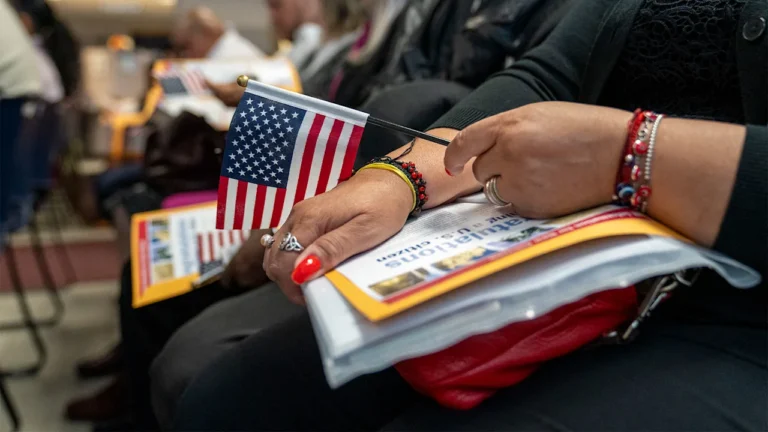
Protests against President Trump’s decision to send the National Guard into American cities have no shortage of whimsy, but the empire struck back against one demonstrator.
A lawsuit filed on October 23 accuses police officers and a National Guard member of violating a protester’s constitutional right to play the “Imperial March” theme from Star Wars.
The D.C. resident, Sam O’Hara, was “tightly handcuffed” and detained for 20 minutes after ignoring a warning from a National Guard member to stop playing the song. In the complaint, O’Hara alleges that four Washington, D.C., police officers, an Ohio National Guard sergeant, and the District of Columbia violated his First Amendment rights.
“Government conduct of this sort might have received legal sanction a long time ago in a galaxy far, far away,” the American Civil Liberties Union, which filed the suit on O’Hara’s behalf, stated. “But in the here and now, the First Amendment bars government officials from restraining individuals from recording law enforcement or peacefully protesting, and the Fourth Amendment (along with the District’s prohibition on false arrest) bars groundless seizures.”
O’Hara began filming the National Guard deployment in D.C. over the summer, often following behind Guard members while playing the song and then posting the videos to a TikTok account that has more than a million likes across 24 videos.
“Armed National Guard should not be policing D.C. residents as we walk around our neighborhoods,” O’Hara said. “It was important to me not to normalize this dystopian occupation.
The “Imperial March” theme is associated with the fictional fascist empire from Star Wars; its main villain, Darth Vader; and the empire’s foot soldiers, the Stormtroopers. The Galactic Empire, long a fixture of pop culture, intentionally echoes the aesthetics and policies of Nazi Germany.
“The government doesn’t get to decide if your protest is funny, and government officials can’t punish you for making them the punch line,” ACLU-DC senior staff attorney Michael Perloff said in a press release. “That’s really the whole point of the First Amendment.”
Clashes over National Guard deployment
The lawsuit is the latest clash in courts over the Trump administration’s decision to deploy National Guard troops to a handful of U.S. cities with Democratic leadership. The National Guard has already been activated in Los Angeles; Washington, D.C.; Chicago; Portland, Oregon; and Memphis, though those deployments are the subject of ongoing court battles between state and local leaders and the federal government. Trump has also threatened deployments in New York City, Baltimore, the Bay Area, St. Louis, and New Orleans.
The National Guard is historically called in by state governors to help with emergencies and natural disasters, but guard members can also be mobilized by the federal government for national emergencies. Last year, National Guard members deployed in 17 states conducted search and rescue missions and delivered food and water to victims of Hurricane Helene.
Since first deploying the National Guard to Los Angeles in June against the wishes of California Governor Gavin Newsom, Trump has escalated his unprecedented use of the state military force in U.S. cities. Trump claims that the National Guard is necessary to quell urban crime, but violent crime has already dropped dramatically in many of the cities targeted for the unusual deployments. Homicide rates dropped by 50% in the first half of 2025 in Portland, Oregon, and in Memphis, robbery, burglary, and larceny hit 25-year lows this year.
“As I have said from the beginning, the number of federal troops we need in Portland is zero,” Mayor Keith Wilson said of the deployment earlier this month. “Not from Oregon. Not from California. Not from Texas. And not from anywhere else.”
On October 23, Trump appeared to back down from a threat to send the National Guard to San Francisco after a persuasive phone call with the CEOs of Nvidia and Salesforce. “Great people like Jensen Huang, Marc Benioff, and others have called saying that the future of San Francisco is great,” Trump wrote on Truth Social. “They want to give it a ‘shot.’ Therefore, we will not surge San Francisco on Saturday.”
Chicken suits and Star Wars
As the courts decide the legality of Trump’s unilateral use of National Guard troops, protesters are weaponizing absurdism and humor against the presence of federal law enforcement. In Portland, the Immigration and Customs Enforcement facility has famously attracted a growing crowd of peaceful protesters wearing inflatable animal costumes. The trend was inspired by the early appearance of a frog-suit-clad activist who has since been pepper sprayed directly into his air-intake vent.
Another Portland protest regular famous for wearing a chicken suit explained the use of humor in a recent interview with the city’s alt-weekly: “What they rely on is fear. So by coming out in an absurdist manner, it [says] that we’re actually not that afraid,” Jack Dickinson, 26, told the Willamette Week.
“When they try to describe this situation as ‘war-torn,’ it becomes much harder to take them seriously,” Dickinson added. “Kristi Noem is up on the balcony staring over the Antifa Army and it’s eight journalists and five protesters and one of them is in a chicken suit.”
